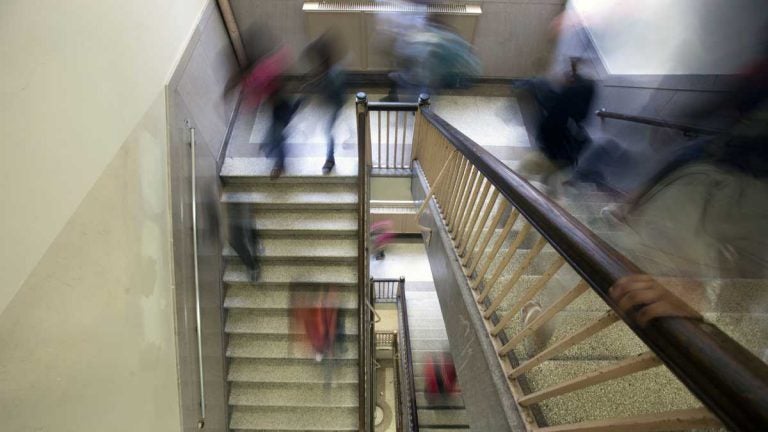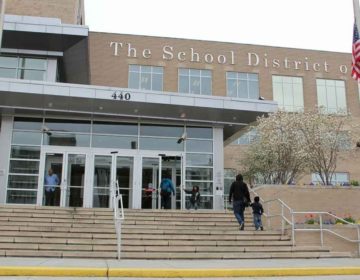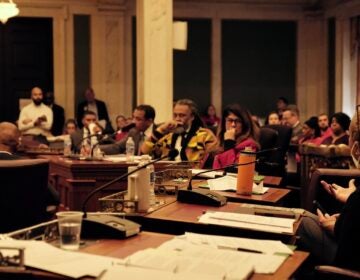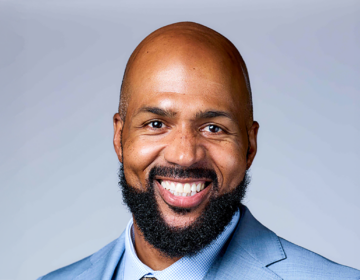GOP makes case for school choice, not money in Pa. funding trial
Witnesses include a Christian private school leader and the executive director of the House Appropriations Committee.

Students change classes at a public school in Pennsylvania. (Jessica Kourkounis for Keystone Crossroads)
After nine weeks of testimony from plaintiffs in a landmark trial over Pennsylvania’s system for funding public education, defense attorneys for GOP legislative leaders have started to present their case.
They opened Wednesday by calling a private, faith-based school leader to the stand, to highlight the school choice options available to commonwealth families through state tax-credit programs.
On Thursday, they continued with testimony from the executive director of the Republican House Appropriations Committee, and a political science professor who argues that standardized test scores do not accurately measure the quality of education that English learners receive.
David Donley, the executive director of the House Republican Appropriations Committee since 2012, said nearly 40% of the state’s general fund budget goes toward education, the second-largest expenditure after human services.
He described the budget process in Pennsylvania, and outlined the other departments and services the commonwealth is responsible for funding.
“We think it’s very important to take into account that the General Assembly must consider all of the needs of the commonwealth and not just education,” said Patrick Northen, an attorney for GOP House Speaker Bryan Cutler, when a lawyer for the plaintiffs asked about the relevancy of the line item for the Department of Human Services.
“While education is treated very important in this budget, there are other things the commonwealth must also fund and that goes into the assessment of a reasonable legislator as to how to fund education,” he said.
Northen also walked Donley through some of the efforts the state has made to direct more money to lower-wealth, higher-need districts, including passing a “fair funding formula” in 2016 that gives extra weight to districts who serve more low-income students and English learners. The state has also added $100 million in “level up” funds to the 2021-2022 budget, targeting the state’s 100 poorest districts.
Defense attorneys have pointed out that Pennsylvania ranks near the top, nationwide, in the amount it spends per student, while plaintiffs say that figure masks wide disparities among districts, and note that the commonwealth is near the bottom in the share of education funding that comes from the state. They also note that the fair funding formula only applies to new education funding, and argue it doesn’t do enough to close the spending gaps.
Christine Rossell, professor emerita of political science at Boston University, also took the stand Thursday. She argued that standardized test scores are not a reliable metric to measure the quality of education English learners receive, partly because students can move out of the EL category once they attain language proficiency.
“Black or Hispanic students, if their scores go up, they’re still Black or Hispanic,” she said. “Disadvantaged students, if their scores go up, they’re still disadvantaged. So they’re still in that category. If a score of an English language learner goes up to a certain point, they leave that group, so the group always consists of low scores.”
But during cross examination on Friday, a lawyer for the plaintiffs pointed out that in Pennsylvania, students who take the statewide standardized tests known as the PSSAs are still classified as English learners for two years after they have “exited EL status.”
Rossell helped design “English for the Children” laws, which ban bilingual education and instead promote English-only, immersion instruction.
She will return to the stand Friday for cross-examination, before the defense closes out its first week of witnesses.
During the first nine weeks of the trial, lawyers for the plaintiffs — which include six school districts, several parents, and two statewide organizations — made the case that Pennsylvania public schools are so underfunded, and the spending gaps between poor and wealthy districts are so wide, that the state is violating its constitutional mandate to provide a “thorough and efficient” system of education.
They called educators from school districts across the state to the stand, to describe everything from crumbling school buildings to oversized classrooms to a lack of support services, and brought up experts to testify that increased funding is the key to closing student achievement gaps.
During cross-examination, attorneys for GOP legislative leaders sought to paint a rosier picture of the plaintiff school districts, pointing to achievements like an award-winning debate team and high level course offerings.
As they build their case in the coming weeks, they are expected to call their own expert witnesses to testify that putting more money into schools doesn’t necessarily boost student achievement.
Defense touts school choice
Their first witness, on Wednesday, served to highlight some of the school choice options available to commonwealth families.
Aaron Anderson, the head of Logos Academy — a private, “Christ-centered” K-12 school with 225 students — said his school is meant to serve a substantial number of children “who live in poverty, and who we believe have not had a fair shot at an education in a failing school district,”
Anderson, an ordained minister, said his student body is 37% white, 28% Latino, 23% Black, and 12% multiethnic or mixed race, with 59% living at or below the federal poverty level. The majority come from York City School District, one of the state’s poorest districts.
Logos Academy students score above the national average on some standardized tests like the SATs, and “there’s not a great disparity in performance” based on students’ income level, Anderson said.
“In general, what we see is that in our environment, especially as students have been with us for years, that they tend to start to perform at very similar levels,” he said.
About half of Logos Academy’s $3.3 million budget comes from two state tax-break programs that provide scholarships for students at private schools: the Educational Improvement Tax Credit (EITC) and the Opportunity Scholarship Tax Credit (OSTC).
Republican lawmakers have long hailed these scholarship programs as a path out of “failing” public schools, and argue that school choice through charters and private school scholarships is the key to improving education in the state, rather than pouring more money into school districts.
Both scholarship programs were criticized in a recent report by the state’s Independent Fiscal Office for lacking basic accountability measures. Pennsylvania does not collect much data on students who receive the scholarships, including their household income, whether they were already attending private school, and how they end up performing academically.
Even though Pennsylvania has one of the country’s largest tax credits, it collects the least amount of data on the program’s outcomes, Spotlight PA reported.
A 2019 WHYY analysis found that many schools that receive this scholarship aid report enrolling zero low-income students.
A family of four can earn up to $130,710— or about 500% of the federal poverty level — and qualify for a scholarship. “This level is higher than all other states that have an income limitation” on their scholarship programs, the IFO report found.
On the stand, Anderson credited the programs with enabling Logos Academy to fulfill its mission as a school for “kids that could never afford what in most communities would be an elite education.
“It’s not that we could not run a school,” he said. “We could run a much, much smaller school, probably not a K to 12 program. But truly there is no way we would be able to retain our staff or to run the program that we have without those tax-credit dollars.”
Under cross-examination, Anderson acknowledged that his school doesn’t always have the ability to serve English learners or students with disabilities, or to admit students who test well-below grade level.
He also acknowledged that small class sizes and supports like reading specialists and tutors are all important for student success. The plaintiffs have argued that, without sufficient funding, they cannot provide these for students.
But, Anderson added, “the culture of the building” is also critical.
The school funding trial is expected to last well into February.

Get daily updates from WHYY News!
WHYY is your source for fact-based, in-depth journalism and information. As a nonprofit organization, we rely on financial support from readers like you. Please give today.









